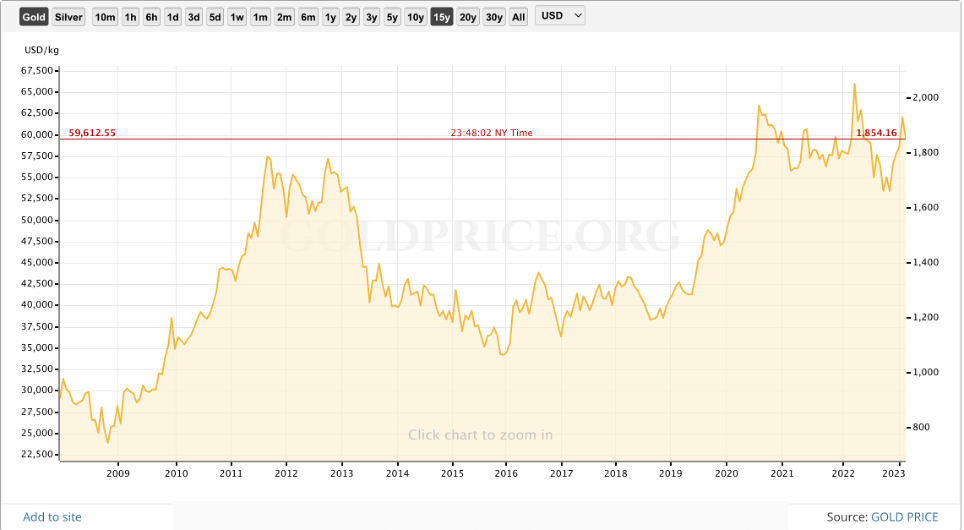|
Getting your Trinity Audio player ready...
|
Inflation began rising in late 2021 as the effects of the monetary policies implemented to combat the economic impact of the pandemic began to surface. The overly loose monetary policies led to an inevitable rise in inflation which forced central banks across the globe to shift their policies into more hawkish approaches and ultimately raise interest rates.
Although this tactic appears to be working, inflation remains at levels not seen since the 1970s. As such, investors are rightfully concerned about how best to position themselves for the coming year to ensure their portfolios yield healthy returns and avoid losing value to the effects of inflation.
In this blog, we will examine the historical data of assets concerning their performance against inflation. In doing so, we will identify which asset classes have historically outpaced inflation and which are likely to continue outpacing inflation in 2023. If you’re interested in learning how to beat inflation in 2023, read on.
Historical Performance
To provide an accurate accounting of the performance of assets against inflation, we need to analyze the performance of these assets during periods of high and low inflation. From 1970 to 2018, the median rate of inflation was 3.6%. However, the first 24 years of this time experienced higher inflation rates, while the second 24 years enjoyed comparatively lower inflation.
As such, we can analyze asset performance between these two 24-year periods. The first 24-year period will be when the CPI data was below the median rate of 3.6% (low inflation). The second 24-year period will analyze the performance of assets when the median rate of inflation was above 3.6% (high inflation). Please note that the returns outlined below are inflation adjusted.
Low Inflation
Throughout the 24 years of low inflation, U.S equities performed outstandingly, as they yielded inflation-adjusted returns of over 10%. Large-cap U.S. stocks provided a 10.80% return, and small-cap U.S. stocks performed slightly better at 11.44%. Real estate was also a strong performer throughout this period, as it yielded a return of 10.30%. As is expected, cash and commodities were the worst performers during this period, with commodities providing a negative return of – 4.03% and cash only modestly avoiding a negative return of 0.4%.
High Inflation
As the data demonstrates, periods of high inflation have a detrimental impact on equity returns. Throughout the 24 years of high inflation, U.S equities performed much worse than they did in the previous 24 years. The inflation-adjusted returns for large and small-cap stocks for this period were 4.70% and 6.26%. Real estate also yielded lower returns with 7.86% compared to 10.30% in the previous 24 years.
Commodities were the top performer throughout this period as they provided impressive returns of 15.3% per year. Unsurprisingly, cash did not perform particularly well during this period as it returned 1.33%. Although this was an improvement over the previous 24 years, the returns still left a lot to be desired.
Overall
According to historical data, commodities have proven to be the best protection for investors during periods of high inflation as they outperformed every other asset class. Equities and real estate faired reasonably well throughout both periods as they yielded healthy returns over the total 48-year period. Unfortunately, cash holdings performed poorly throughout the entire period as investors holding cash barely secured any return from their holdings.
Ultimately, the data suggests that the best defence against inflation over the long term would be a well-diversified portfolio of equities, real estate, and commodities with small amounts of cash. That said, if investors believed that inflation would remain at the median rate of 3.6% or lower, they would be best advised to invest more heavily into equities and real estate as these have historically outperformed inflation during periods of low inflation.
Source of data: https://static.twentyoverten.com/58fa971131d0d277e8275836/S59MIx6J9rly/Inflation-and-Asset-Performance-A-Review-of-the-Past-48-Years.pdf
How to Beat Inflation in 2023
As we have seen above, inflation directly impacts the performance of asset classes over time. To beat inflation in 2023, investors will need to ask themselves whether inflation will continue to trend down or climb higher in the second half of the year. In this section, we will analyze various asset classes and discuss which ones have the highest probability of beating inflation in 2023.
Cash
Considering the historical data, it is not surprising to hear that cash is not often thought of when considering ways to beat inflation. That said, as interest rates on savings accounts rise and equities continue to endure heavy turbulence, some investors may wonder whether they should stockpile cash for the remainder of 2023.
Many financial advisors recommend keeping a certain percentage of your portfolio in cash. Although the specific amount will vary depending on the advisor, investor risk tolerance, and personal circumstances, the general advice remains to keep cash as a position in your portfolio. The question is, does this advice hold in the current environment?
Given the arguably overly compressed nature of equity valuations coming out of 2022, you could argue that the old saying “cash is trash” holds. Investors may rightly consider taking advantage of these cheaper valuations to put their cash to work in the market. This approach may seem counterintuitive given the rising interest rates on savings accounts and the volatility the equity markets have seen over the last 12 months, but historically, investing in equities during periods of instability has proven to be more profitable than investing in other periods.
As a result, investors with a higher risk tolerance may be well-advised to keep a 6-month emergency fund in cash and invest all other cash positions into the market.
Gold
Although not outlined in the historical data above, gold has been long thought of as a hedge against inflation due to its limited supply and practical value. However, notable investors such as Warren Buffet have shied away from gold as a hedge against inflation over the last few years. As Buffet famously noted, “if you own one ounce of gold for an eternity, you still own one ounce of gold at its end”.
The price action of gold since 2011 seems to support the thesis that gold is no longer a viable hedge against inflation. As the data below shows, gold’s price is only modestly higher today than it was in 2011.
As such, gold may not be the most reliable asset to protect your portfolio against the effects of inflation.

We have seen that equities generally secure healthy returns over the long term, regardless of inflation. That said, not every stock will perform well over time, and it becomes more challenging to secure strong returns from equities during periods of high inflation.
As such, it is good practice for investors to diversify their equity investments with low-cost index funds or ensure that they invest in reliable equities capable of providing healthy returns over the long term.
Although this may seem straightforward, most retail investors fail to accomplish this consistently over time. Since we are currently experiencing higher-than-usual inflation, let’s examine two key factors to consider when analyzing equities during periods when inflation is high.
Low Capital
When inflation is high, it is more expensive to borrow money. As a result, drawing on credit facilities and investing in companies during this period becomes more expensive and less advantageous.
As such, investors would ideally consider investing in companies that have low capital requirements to operate. When inflation is high, businesses with low capital requirements are more likely to maintain their earnings and should perform better than businesses that require more regular investments to maintain performance.
Pricing Power
As Buffett once mentioned, the most critical decision when evaluating a business is how much pricing power it commands. When inflation is high, companies will need to raise the prices of their products without losing business to a competitor.
If a business commands significant pricing power, it has a massive advantage during periods of high inflation as it can offset its increased costs. This makes pricing power something to consider when evaluating which equities to invest in for 2023.
Fixed Income
Fixed-income investments include any investment that provides a fixed and consistent rate of return. It includes treasury bonds, corporate bonds, and certificates of deposits. These investments are significantly less volatile than equity investments and can often serve as a steady source of income for investors with a shorter investment horizon. Unfortunately, they are also negatively impacted by inflation, making them widely unsuitable investment vehicles for beating inflation in 2023.
However, the deVere Group is offering a structured fixed-income product designed to outpace inflation. There is a range of different options available as we intend to cater to individuals in a wide set of circumstances.
If you’d like to find out more about deVere’s structured fixed-income products, we encourage you to click here
Conclusion
Although some analysts have argued that the war against inflation has now reached a turning point as inflation continues its downtrend, the current rate of inflation remains considerably higher than many investors are comfortable with.
The historical data suggests that the best defence against the eroding effects of inflation is a well-diversified portfolio that incorporates equities, real estate, and commodities. That said, there is no universal formula for calculating optimal diversification in every portfolio. As such, investors will need to determine the exact composition of their portfolios themselves or instruct the services of a financial advisor. We hope this blog provided you with some insight into how to beat inflation in 2023.
If you have any questions or require more tailored advice concerning your investment portfolio, please feel free to contact one of our advisors.




